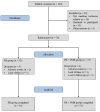Effectiveness of Combined Pulmonary Rehabilitation and Progressive Muscle Relaxation in Treating Long-Term COVID-19 Symptoms: A Randomized Controlled Trial
- PMID: 39458187
- PMCID: PMC11508716
- DOI: 10.3390/jcm13206237
Effectiveness of Combined Pulmonary Rehabilitation and Progressive Muscle Relaxation in Treating Long-Term COVID-19 Symptoms: A Randomized Controlled Trial
Abstract
Background: The aim of this study was to investigate the effects of pulmonary rehabilitation (PR) and additional progressive muscle relaxation (PMR) techniques in patients with long-term COVID-19 symptoms. Methods: We included 61 patients with long COVID-19 symptoms and randomly assigned them to two groups: PR only (group 1 with 30 subjects) and PR with PMR (group 2 with 31 subjects). The PR program consisted of gradual aerobic conditioning, strength training, and breathing exercises. Group 2 received additional 20 min daily sessions of progressive muscle relaxation techniques. Results: Following a 21-day intervention, it was observed that both groups had noteworthy improvements in lung function, exercise capacity, and sleep quality with statistical significance (p < 0.0001). Group 2 showed significant improvements in overall health (as measured by the General Health Questionnaire-12), patient health (as assessed by the Patient Health Questionnaire-9), general anxiety levels (as indicated by the Generalized Anxiety Disorders Scale-7), and sleep quality (as measured by the Pittsburgh Sleep Quality Index), with statistical significance (p < 0.0001), compared to group 1. Moreover, the statistical analysis demonstrated no significant difference in exercise capacity improvement between group 1 and group 2, as indicated by a p-value of 0.1711. Conclusions: The addition of progressive muscle relaxation to pulmonary rehabilitation significantly enhances mental health outcomes, particularly in reducing anxiety and improving sleep quality, for patients with long-term COVID-19 symptoms. These findings suggest that incorporating PMR into PR programs offers a valuable non-pharmacological approach to improving overall patient well-being during long-term COVID-19 recovery.
Keywords: anxiety reduction; exercise capacity; long COVID-19; progressive muscle relaxation; pulmonary rehabilitation.
Conflict of interest statement
The authors declare no conflicts of interest.
Figures





References
-
- Terán-Pérez G., Portillo-Vásquez A., Arana-Lechuga Y., Sánchez-Escandón O., Mercadillo-Caballero R., González-Robles R.O., Velázquez-Moctezuma J. Sleep and Mental Health Disturbances Due to Social Isolation during the COVID-19 Pandemic in Mexico. Int. J. Environ. Res. Public Health. 2021;18:2804. doi: 10.3390/ijerph18062804. - DOI - PMC - PubMed
LinkOut - more resources
Full Text Sources
Research Materials

